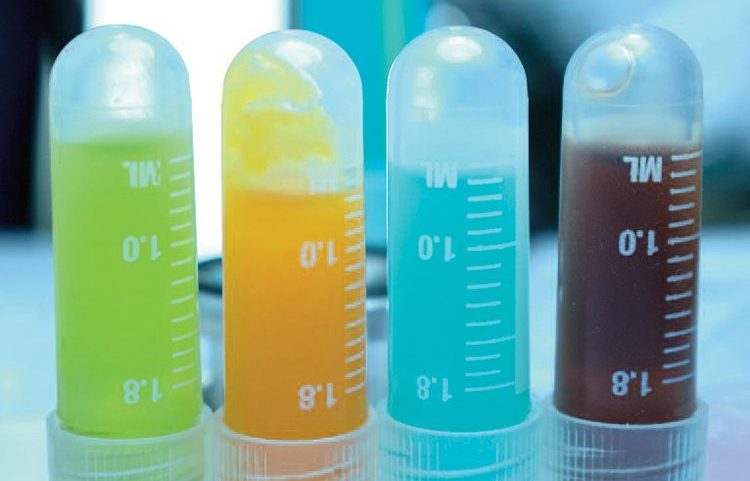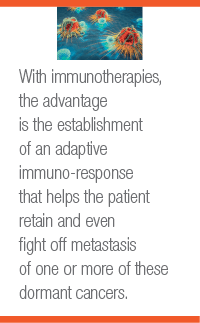Frost & Sullivan recently invited academic and industry leaders in immuno-oncology (I-O) to participate in a new and unique thought leadership forum, our Virtual Think Tank series. This forum was initiated to discuss the current state of immunotherapies, implications of research and development occurring today, key challenges, and future approaches to the targeted use of the immune system in cancer treatment.

Immunotherapies for Cancer
Various approaches to leveraging the human body’s own immune system to overcome tumor evasion are revolutionizing how cancer is treated. Immuno-oncology (I-O) treatments have the potential to generate long-term survival as significant response rates and durable remissions are occurring in both monotherapy and combination therapies for several different tumor types.
Learn about Cancer Immunotherapy
Development
Get Info
Despite the successes in clinical trials, there are numerous challenges with the use of I-O therapeutics. Studies are underway to determine what can be done to improve response rates of patients who do have specific biomarkers. Currently, predictive biomarkers are effective in only a small fraction of patients. Side effects are a major problem with the use of immunotherapeutics, particularly cytokine release syndrome (CRS) and neurotoxicity, which occur in many patients and can be fatal.
Commercial hurdles are very high, especially for novel therapeutic interventions such as autologous cell therapies. Collaboration between stakeholders in different segments of I-O research is key to accelerating the development of the next generation of successful treatments.
Regardless of the I-O approach taken — be it a checkpoint inhibitor, adoptive T-cell therapy, cancer vaccine, oncolytic virus therapy, or nonspecific immunotherapy — the immune system still has the ability to mask the existence of tumors. With each new I-O approval, disease management requires oncology clinicians to refocus the way they treat their cancer patients, across numerous tumor types. Cancer care is transforming as new discoveries move from clinical trials to marketed therapeutics.
Progress in Immuno-Oncology Research
The experts that joined Frost & Sullivan’s Virtual Think Tank on Immunotherapies are studying various therapeutic approaches, including checkpoint inhibitors, cancer vaccines, adoptive T-cell therapies, nonspecific immunotherapies and oncolytic virus therapies. While the I-O field continues to evolve, challenges remain in the resource-intensive and highly specialized clinical trials.

 Dr. Xinfeng Bao, an accomplished cancer immuno-biologist and pharmacologist, is an expert in translational pharmacology for target identification, lead discovery/optimization, and biomarker identification for cancer immunotherapies. He currently serves as the Director of Immuno-Oncology for discovery and translational research at Eisai. He has brought several advanced cancer immunotherapy discovery programs into clinical development and is responsible for the early discovery and translational research of some immunotherapy agent development. Eisai and Merck have partnered to co-develop Eisai’s Lenvima (lenvatinib), which is an oral kinase inhibitor originally discovered by Eisai. Lenvima is now in combination clinical trials with Merck’s anti–PD-1 therapy, Keytruda (pembrolizumab), in four different tumor types: unresectable hepatocellular carcinoma (HCC), squamous cell carcinoma of the head and neck (SCCHN), advanced renal cell carcinoma (RCC), and advanced endometrial carcinoma (EC). Merck’s global position with Keytruda could help Eisai’s drug attain blockbuster status.
Dr. Xinfeng Bao, an accomplished cancer immuno-biologist and pharmacologist, is an expert in translational pharmacology for target identification, lead discovery/optimization, and biomarker identification for cancer immunotherapies. He currently serves as the Director of Immuno-Oncology for discovery and translational research at Eisai. He has brought several advanced cancer immunotherapy discovery programs into clinical development and is responsible for the early discovery and translational research of some immunotherapy agent development. Eisai and Merck have partnered to co-develop Eisai’s Lenvima (lenvatinib), which is an oral kinase inhibitor originally discovered by Eisai. Lenvima is now in combination clinical trials with Merck’s anti–PD-1 therapy, Keytruda (pembrolizumab), in four different tumor types: unresectable hepatocellular carcinoma (HCC), squamous cell carcinoma of the head and neck (SCCHN), advanced renal cell carcinoma (RCC), and advanced endometrial carcinoma (EC). Merck’s global position with Keytruda could help Eisai’s drug attain blockbuster status.
Dr. Tyrel Smith is an immuno-oncologist working at OncoResponse, a privately held biotech company in the Seattle area. His research leverages the human immune system to identify fully human monoclonal antibodies (mAbs) and discover novel targets for the development of antibody-derived therapeutics for the treatment of cancer. From Theraclone Sciences, OncoResponse licensed the iSTAR platform, a robust and proven human mAb discovery platform that identifies elite responders to immunotherapy and rapidly screens the adaptive immune system to discover antibodies. These antibodies function to facilitate an immune response addressing an unmet medical need in patients who are partial or nonresponders. This approach expands the promise of immunotherapy to a greater number of patients.
Another esteemed panelist, Dr. Dawne Shelton, leads development projects for in vitro diagnostic tests at Bio-Rad. Dr. Shelton is interested in understanding how low levels of neoantigens can be used to amplify cancer targets.
 Immunology is becoming the cornerstone for oncology therapeutics and Dr. John W. Bullen (MedImmune) focuses on target identification in early research programs as well as addressing checkpoint inhibitor resistance signaling pathways. MedImmune has a well-developed immunotherapeutic portfolio that targets tumors both at the immune system level and in the tumor microenvironment.
Immunology is becoming the cornerstone for oncology therapeutics and Dr. John W. Bullen (MedImmune) focuses on target identification in early research programs as well as addressing checkpoint inhibitor resistance signaling pathways. MedImmune has a well-developed immunotherapeutic portfolio that targets tumors both at the immune system level and in the tumor microenvironment.
Dr. Arthur Brodsky writes for the Cancer Research Institute (CRI) and leads the science writing efforts in immunotherapy with a stated goal of “publicizing important breakthroughs in the immunotherapy area.”
Another promising I-O approach was covered by Dr. Darrell R. Borger, the Scientific Director of the new Immuno-Oncology Laboratory at Massachusetts General Hospital and Cancer Center, who bridges his expertise in cancer signaling and scientific platform development to drive basic research projects. Borger works “to identify new biomarkers that can predict responses to therapy as well as acquired resistance.” He has introduced new biomarkers to his clinical laboratory where he and his team have worked to develop laboratory tests.

Currently Available Immunotherapies
Immense progress has been made in the past several years in immunotherapy treatment for different diseases. Shelton indicated, “There is great optimism that these therapies will trigger the human immune system to put some cancers into longer remissions, if not cure diseases. As diagnostic tools and tests are developed to track the immune system’s cellular movements, responses, and resistance, strides will be made in the treatment of disease. It will be the combinations where you see the greatest numbers of patients being able to respond.”
One area that has been studied extensively is the area of checkpoint inhibitors. Borger stated “the focus had been with the co-stimulatory or co -inhibitory functions of target therapies that involve the immune pathways such as PD-1, PD-L1 and CTLA-3. In addition, the other checkpoints that are being looked at are the LAG-3.” Brodsky added that “there are six FDA-approved checkpoint immunotherapies currently approved for 11 different cancers.”
With regard to the chimeric antigen receptor T-cell (CAR-T) therapies that have been approved, Brodsky said that “with those therapies, the patient’s normal immune system cells are removed from the patient and equipped with a specialized CAR receptor, which directs the immune systems cells to more effectively target cancer cells.” The current FDA-approved CAR-T therapies (Novartis’ Kymriah and Gilead/Kite’s Yescarta) treat hematological malignancies, one for the treatment of leukemia and the other for the treatment of lymphoma. Brodsky further elaborated that “solid tumors are much more of a challenge for checkpoint inhibitors than blood cancers.”
The Most Promising Immunotherapies Open New Treatment Pathways
 There have been dramatic changes in the way many doctors are treating cancers, specifically melanoma skin cancers. The use of checkpoint inhibitors such as pembrolizumab (Keytruda), nivolumab (Opdivo), and ipilimumab (Yervoy) have led to better outcomes in many patients. These drugs work by blocking certain proteins that in the past have acted like molecular brakes for different T-cells. Without the brakes, the T-cells can more effectively recognize and kill the cancer cells that once went undetected.
There have been dramatic changes in the way many doctors are treating cancers, specifically melanoma skin cancers. The use of checkpoint inhibitors such as pembrolizumab (Keytruda), nivolumab (Opdivo), and ipilimumab (Yervoy) have led to better outcomes in many patients. These drugs work by blocking certain proteins that in the past have acted like molecular brakes for different T-cells. Without the brakes, the T-cells can more effectively recognize and kill the cancer cells that once went undetected.
In addition to the approved checkpoint inhibitors and CAR-T therapies, Brodsky reported “there is a recent drug, blinatumomab (Amgen’s Blincyto), which is a bispecific antibody that can target the tumor on one end and, with the CD-3 on the other end, can attract T-cells. The T-cells can come in and also attack the cancer.” Patients that once had diseases with few treatment options may now experience long remissions and the possibility of being cured. Borger said “immunotherapies have mechanisms that are so much more complicated and different than traditional targeted therapies, so there’s a whole new set of options for patients, particularly patients with advanced cancers that have gone through the standards of care and where there are not many options to pursue.”
Smith added that “with immunotherapies, the advantage is the establishment of an adaptive immuno-response that helps the patient retain and even fight off metastasis of one or more of these dormant cancers. Checkpoint inhibitors are activating the immune system responses with better outcomes.” Bao indicated that “the combinations of different treatment modalities make the future very bright.”
Future Considerations for Successful Therapy Developments
Brodsky noted “one of the current focus areas are personalized vaccines, where we still need to figure out exactly what mutations or neoantigens a patient’s tumor has and to target those. Once there is some evidence that the targets identified are in the tumor, the immune system can help finish the job.”
Borger added that “we’re starting to really identify a lot of tumor biomarkers that are decent predictors of response to very specific types of drugs. We are getting to a point where patients need to be immuno-typed so that therapies can be very specifically targeted.”
![With [approved] therapies, the patient's normal immune system cells are removed and equipped with a specialized CAR receptor, which directs the immune systems' cells to more effectively target cancer cells.](https://www.bioradiations.com/wp-content/uploads/2018/12/18-0401_pq4_3.png) Payor sentiments mirror those of our experts in believing that patient-specific biomarker tests are critical determinants for the use of specific therapies. I-O drugs are extremely expensive, so it is imperative to be certain a patient has the correct biomarker and a strong likelihood of responding to a given drug before it is administered.
Payor sentiments mirror those of our experts in believing that patient-specific biomarker tests are critical determinants for the use of specific therapies. I-O drugs are extremely expensive, so it is imperative to be certain a patient has the correct biomarker and a strong likelihood of responding to a given drug before it is administered.
Borger added, “With cancer, the larger your toolbox, the more successful ultimately you are going to be, and this is true with immunotherapy. With the immune system, you have a whole new type of platform to look at. It is based on histological testing, multiplex immunofluorescence and how you look at many targets simultaneously. You need to understand which immune cells have infiltrated the tumor and consider the ratios.” He continued, “You have to consider the spatial content and what signals are presented on the tumor cells that might influence the therapy. We also need to start thinking about circulating markers that can be monitored very early in the course of the immunotherapy treatment.” Adopting these principles would make it possible to know early on that a given immunotherapy treatment is the correct one for the patient and that the treatment is on course.
 While the toolbox gets larger, decision making becomes more complex, especially when considering combination therapies. Shelton shared the opinion that “combinations of immunotherapies that unmask tumors are going to be one of the biggest challenges for doctors.” This is due to an inability to reliably predict how drugs will act in combination with one another.
While the toolbox gets larger, decision making becomes more complex, especially when considering combination therapies. Shelton shared the opinion that “combinations of immunotherapies that unmask tumors are going to be one of the biggest challenges for doctors.” This is due to an inability to reliably predict how drugs will act in combination with one another.
Continuing on the topic of future therapies, Brodsky suggested that “new technologies will allow scientists to discover and validate the biomarkers and that is what will advance the field. The biomarkers will help doctors identify the correct course of treatment and their potential value will come in the clinic.”
Every panelist cautiously noted that the relationship between tumors and the immune system is an evolving science. It is not just about targeting the cancer; it is about remembering to consider the larger micro-environment and asking what the best way to manage a given cancer is? There are still formidable challenges with many tumor types, particularly solid tumors.
Conclusion
 While longer remissions are presently the norm with some immunotherapies, the potential of a cure is not out of the realm of possibility. Borger indicated that “CAR-T cell therapies will play an important role in the advancement of cancer treatments.” Bullen further concluded that “the most exciting part about immunotherapy is we began with checkpoint inhibitors and now are realizing that there is so much more that can be done to boost the immune system to treat cancers in very specific ways. The patient’s tumor may not disappear, but it becomes manageable, like diabetes. The treatments can let patient live and enjoy their lives, which is also a success.”
While longer remissions are presently the norm with some immunotherapies, the potential of a cure is not out of the realm of possibility. Borger indicated that “CAR-T cell therapies will play an important role in the advancement of cancer treatments.” Bullen further concluded that “the most exciting part about immunotherapy is we began with checkpoint inhibitors and now are realizing that there is so much more that can be done to boost the immune system to treat cancers in very specific ways. The patient’s tumor may not disappear, but it becomes manageable, like diabetes. The treatments can let patient live and enjoy their lives, which is also a success.”
Though positive responses to immunotherapeutics have been seen in the clinic — namely with melanoma, lung cancer, and colon cancer — there are cancers without those responses. More studies of tumors with low levels of neoantigens need to be completed so that cancer targets can be identified and amplified.
Secreted factors and neoantigens are critical and important to immunotherapies. Ultimately, it would be ideal to knock out the support system tumors have by using the patient’s own immune system. It will be important to develop an understanding of the genetic instability tumors possess and understand tumors beyond checkpoints and communications between immune cells and cancer cells.
Our panelists cautioned that immunotherapy is not the be-all, end all. But there is a critical role for the immune system to play, especially in the advanced stages of cancer, since traditional standard-of-care therapies do often work fairly well. Great success has been attained for these game-changing therapies, and although they do not work for every patient, they represent an unprecedented improvement in cancer treatment.
Barbara Gilmore, Senior Consultant, Transformational Health, Frost & Sullivan
Bio-Rad is a trademark of Bio-Rad Laboratories, Inc. in certain jurisdictions. All trademarks used herein are the property of their respective owner.

